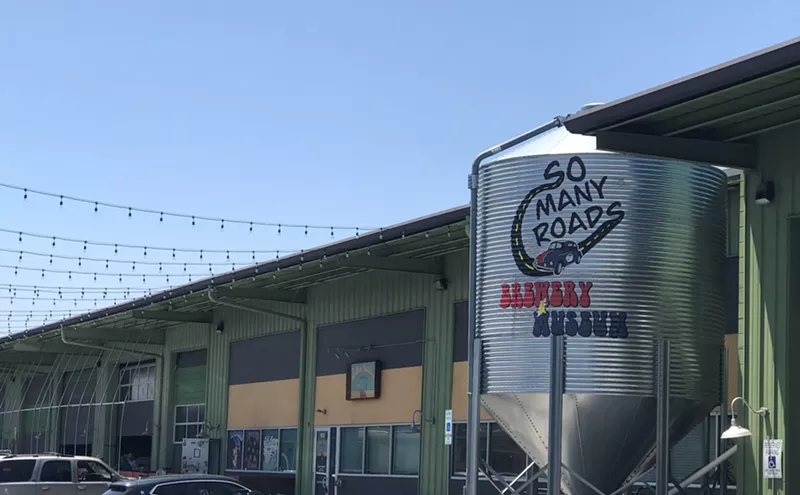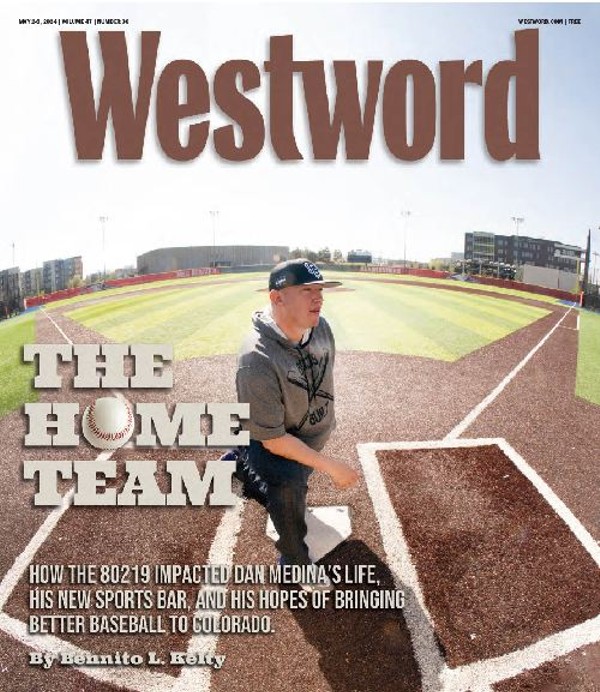Some repercussions rapidly became clear. Davies had planned to fly to the U.S. for a series of dates based on The Storyteller, a solo show in which he interweaves reminiscences and observations from his early days with such Kinks favorites as "You Really Got Me," the tune that first thrust him into the spotlight 37 years ago. But with all American air travel shut down, he had to cancel several appearances and briefly considered calling off the entire tour before having a conversation that convinced him to forge ahead.
"I spoke to my sister, who's a lot older than I," notes Davies, 57. "She said that during the World War, my dad used to love the music halls. Even when London was being bombed by the Germans, he used to go to them, and they always had things happening in them, because everyone considered it to be important to keep up their spirits. So I took a cue from that, and I think it was proven to be the right thing when I got to Boston, the first date I was able to play. When I went on, the audience gave me quite an ovation, as if to say, 'We're glad you made the effort to come.' That showed me it's important to keep on -- that people do need to get out, because otherwise you're succumbing to all the terror and all the threats."
Still, this warm reception didn't make Davies immune to doubts about propriety. He's among the untold thousands of artists who've re-examined their work in recent weeks with an eye toward determining if the messages they're sending have somehow been altered by the destruction of both the World Trade Center and the illusion of security previously enjoyed by millions here and abroad.
"It made me really think about all the lyrics I've written," he says. "And a couple songs I felt -- well, not that they were inappropriate, but I found it hard to sing them right now. Because I think about my lyrics anyway, and people do listen to my words, I needed to make sure that they didn't have an edge to them I hadn't intended."
When he's asked to name the compositions he's resting, Davies avoids doing so, perhaps because he fears putting a pox on them in the minds of others -- like, for instance, programmers at Clear Channel, the largest owner of radio stations in America, who recently circulated a list of 150 ditties, including John Lennon's "Imagine," that allegedly might offend fragile listeners ("Stop Imagining," September 27). He isn't surprised by the actions of Clear Channel, whose concert wing is promoting his tour: "I suppose they had their reasons for doing it. I guess it's like any other business at a time like that. Wal-Mart finds they have a few poisoned goods on the shelf, so they pull everything." Nonetheless, he sees the targeting of "Imagine" as "a bit extreme, since the song is about peace and harmony, basically."
That Davies sees the absurdity of this situation is to be expected. As Kinks fans realize, he's one of rock's most trenchant social critics, regularly exposing pretense and stupidity via songs that can be humorous, poignant or a combination thereof. But with rare exceptions, such as "A Gallon of Gas," penned during the '70s oil shortage, Davies seldom uses topical occurrences for creative fodder -- not overtly, anyway. As he puts it, "I don't sit down with a newspaper, read the stories and then write songs." Instead he tends to conceive characters -- some who live for the length of a tune, others for entire albums -- through which he filters his observations and experiences.
Some of these figures are real: Witness David Watts, immortalized in a good-natured song of the same name ("I dream I could fight like David Watts/Lead the school team to victory/And take my exams and pass the lot") that was memorably remade by the Jam. "He's dead, actually, poor David," Davies says. "He lived in the midlands in England and was a great chap, a real Englishman. Somebody who came to one of my writing courses knew him and told me he died about three or four years ago. He lived in the West country, and he died quite well off." Other personages are "partly based on real people, but for the most part fictitious," he goes on. "Like Johnny Thunder and Monica, from The Village Green Preservation Society. And to me, they do have lives, they do exist. It's odd, yeah -- an impressionistic way of writing. People like Lautrec and Degas with his ballet dancers -- they painted people that had that frosty edge; they didn't really have an identity, but they had substance. It's a bit like that."
Before long, Davies may be adding to his personal gallery. He's in the midst of recording new compositions for a CD he hopes to have out next summer; astonishingly, it's to be his first-ever solo studio recording. At present, he has about forty songs from which to choose, and he openly admits that the new realities we're facing may well play a role in determining which of them will make the final cut.
"What goes on around me does have an impact," Davies confirms. "That's something I've realized doing The Storyteller -- how influential my life is on my lyrics and my lyrics on my life."
For the better part of a decade, Davies has focused on documenting his life, using a variety of approaches to do so. In addition to The Storyteller (a CD version was released in 1998), there's 1995's X-Ray, an elaborate and ambitious autobiography, and 1999's Waterloo Sunset: Stories, a collection of vignettes inspired by Kinks tunes and supplemented by a longer tale whose aging rock-star protagonist is clearly modeled after Davies. This concentration on self smacks of egocentrism, but fortunately, Davies's career has seldom been less than intriguing -- and the soundtrack that's accompanied it is one of rock's finest.
Ray and his brother, Dave, nearly three years his junior, grew up in a section of London called Muswell Hill, an origin commemorated in the title of 1971's Muswell Hillbillies, a likable, largely overlooked Kinks album reissued in 1998. Precisely how the pair wound up in a band together is a matter of some dispute: Dave, who's written an autobiography of his own (it's cleverly titled Kink) tells the tale one way, Ray another. But suffice it to say that the twosome, whose feuds and fisticuffs make Oasis's battling Gallagher brothers seem like pikers by comparison, were the key members of an outfit dubbed the Ravens when, in 1963, the combo was inked to the Pye label. In early 1964, the group changed its name to the Kinks just prior to unleashing its first single, but neither that track, a cover of Little Richard's "Long Tall Sally," nor its successor, "You Still Want Me," made much more than a ripple on U.K. music surveys. But "You Really Got Me," built on Dave's hugely influential, gloriously distorted riff and Ray's beyond-rudimentary declarations of romantic confusion, broke the band first in its homeland and shortly thereafter in America, amid the second wave of the British Invasion.
The popularity of "You Really Got Me" helped an album named for it climb to number 29 on Billboard's sales roster in 1965, and Kinks-Size, featuring the aggressive "All Day and All of the Night" and the considerably more introspective "Tired of Waiting for You," did slightly better. But despite sporting three thoroughly enjoyable singles ("A Well Respected Man," "Dedicated Follower of Fashion" and "Who'll Be the Next in Line"), Kinkdom, the act's third U.S. album, failed to reach such heights, setting the stage for a recognition downturn that, in retrospect, seems positively criminal.
Between late 1965 and 1969, the Kinks put out a blizzard of superb EPs, as well as five full-lengths: The Kink Kontroversy, Face to Face, Something Else by the Kinks, The Kinks are the Village Green Preservation Society, and Arthur (or the Rise and Fall of the British Empire). Each of the latter is impressive on its own, and when viewed as a whole, the music compares favorably with the accomplishments of the Beatles and the Rolling Stones over the same period. Yet Face to Face wasn't put out in America in its original form, even though it features "Sunny Afternoon," another domestic fave, and the rest, distributed by Reprise Records, were allowed to wither on the vine. None of them got within sniffing distance of the U.S. album top forty.
The usual excuse for this poor performance is Davies's inveterate Britishness; his obsession with the class system, in particular, supposedly bewilders Yanks. But that doesn't explain why a list of the best British albums of all time offered up last year by England's Q magazine didn't include a single Kinks offering -- a choice that prompted journalist Stephanie Zacharek, writing for the Web site Salon, to pen an entire essay decrying the injustice. Davies, for his part, doesn't get too exercised about the oversight: "Q is such a fashion-victim magazine -- and I did write 'Dedicated Follower of Fashion,' and maybe they took offense to that." He laughs. "Their memory only goes back about five years, so I wouldn't take it to heart.
"Overall, I think the Kinks receive their due. We were one of the first British bands to be inducted into the Rock and Roll Hall of Fame [in 1990], and I feel privileged to be in it. I think the real institutions, if you like, acknowledge the Kinks."
Following the stateside flop of Arthur, the Kinks seemed unlikely to receive public acclaim ever again. But 1970's "Lola," from the wry music-industry satire Lola Versus Powerman and the Moneygoround, Part One, changed all that. This comic encounter between a swoony young man and a person who may or may not be a transvestite ("I know what I am, and I'm glad I'm a man/And so is Lola" is a couplet whose mysteries may never be plumbed) became an instant radio classic whose notoriety led directly to the Kinks signing a fat contract with a new label, RCA. This initially looked like a good move for the company: While Muswell Hillbillies didn't move many units, it received plenty of critical praise, and its studio successor, the relatively shaky Everybody's in Show-Biz, at least contained "Celluloid Heroes," a mawkish ode that somehow managed to connect with FM music directors. But afterward, Davies cranked out a series of concept pieces -- Preservation: Act 1, Preservation: Act 2, Schoolboys in Disgrace, Soap Opera -- that failed to gain widespread acceptance for a far better reason than was the case with the neglected masterworks that preceded them. Plainly said, they weren't very good.
But the Kinks had several lives left. After being dumped by RCA, the band re-emerged on Arista as a more song-based unit -- and to the delight of fans, many of those songs rocked more than they pontificated. Sleepwalker, from 1977, charted higher in the States than any Kinks record since 1966's Greatest Hits, and beginning a year after Van Halen scored with a cover of "You Really Got Me," Ray and company reeled off three gold albums (Low Budget, One For the Road, Give the People What They Want) plus a fourth, State of Confusion, that contained "Come Dancing," as unlikely a smash as any in the Kinks catalogue.
"The record company didn't like it at all," Davies recalls, "and when the band heard it, the bass player, Jim [Rodford], said, 'I can't pin this down.' Musicians like to put things in compartments -- 'This is three-four,' 'This is heavy metal' -- but no one could do it, because it was so innocent. The innocence is the key. It's a simple song about a guy who lives in East London who has a ballroom that's closing, but the innocence got through to America as well."
"Come Dancing" upped Davies's profile, and he took advantage of the opportunity by branching out into film with 1985's Return to Waterloo, a project whose accompanying album was released under his name rather than that of the Kinks, and an appearance in director Julien Temple's stylish 1986 musical, Absolute Beginners.
That, however, was just about that. The Kinks wore out their welcome at Arista; did likewise at another label, MCA, for which they made three dispiritingly mediocre LPs; stuck around Columbia Records long enough to produce 1993's weak Phobia, marred by "Hatred (A Duet)," which tried and failed to make hay out of the Ray-Dave friction; and by 1996 were reduced to re-recording their old songs for the disposable To the Bone. It's no wonder, then, that neither Ray nor the Kinks is presently signed to a U.S. record contract.
But Davies doesn't seem troubled by these circumstances, and if signs don't necessarily point to a full-fledged Kinks revival, there's certainly been a rekindling of interest, exemplified by two Kinks tribute discs in the works. Seattle's Burn Burn Burn Records is assembling Give the People What We Want, with contributions from Mudhoney, Mark Lanegan, the Young Fresh Fellows, the Murder City Devils and the Makers, among others. Also on tap is This Is Where I Belong: The Songs of Ray Davies and the Kinks, due on Praxis in early 2002, with participants ranging from Fountains of Wayne and Matthew Sweet to Queens of the Stone Age and Damon Albarn (of Blur and Gorillaz), who clearly views Davies as a role model. Davies has heard several tracks from the Praxis package, and, he says, "I'm amazed by the bravery of these people picking songs that weren't necessarily hits. They pick songs like 'Better Things' and 'Big Sky,' which are by and large Kinks cultist tracks."
Davies cheekily refers to the groups saluting him as "bands that are too cool for Q magazine," and on several occasions of late, he's gone out of his way to embrace the new generation of indie rockers. At this year's South By Southwest music confab in Austin, Texas, he not only climbed on stage with Superdrag, a fine power-pop band, and the New Pornographers, a collective helmed by Zumpano's Carl Newman, but he delivered the gathering's keynote speech, displaying along the way a keen appreciation for emerging talent and a hard-earned derision for the more oppressive aspects of the music business.
"When I first started out -- I talk about it in my show -- it was inevitable that pop music in England was going somewhere," he says. "But now there's this incredible industry, and kids going into it have to be aware of that. Since most of them are bright and well educated, I think they're more savvy and more aware that it's run by big corporations, and they're ready for it. I don't know that I would be. I would probably find it daunting. Sometimes when you're talking to record companies, they have to look at their demographics and their statistical things and their marketing, and there's always the question of what facet of the music industry you fit in. Are you classic rock? Are you dance? Are you rap? It's gotten so fragmented now, I don't think anyone really knows where they're going.
"That's why I lament the state of corporate rock now. It's gotten such a paranoid edge that something's got to change. Otherwise, a lot of the bands I saw at South By Southwest -- and there were a lot of very good bands there -- won't get signed, and we'll just have safe music on the radio, which I don't think is healthy. It's just like a film that's been processed by all the producers in Hollywood until all the soul's been kicked out of it. After it goes through the corporate stuff, with all the rules and stipulations they have, it gets watered down, and in the end, it sounds empty."
To avoid falling into this trap himself, Davies is spending a lot of time finding the right balance for his forthcoming album. Its theme is likely to be "transience," he says. "That's the only word to describe it, because it's a transitional thing. But I want it to be very simple and not what people expect. When most people do their first solo projects, the recordings tend to get overblown, and I don't want that. To me, cutting and editing is crucial, because that's how you get to the essence of what you're trying to write about. I think back to those early songs I wrote -- how simple they were, and how easy to write. Most of them didn't have smart rhymes, and the structure...I'm not really fond of the structure of 'Waterloo Sunset,' but when you put it together, it works. And that's what's important."
To date, Davies hasn't settled on precisely who will be helping him play his latest numbers. This past summer, he starred in a couple of showcases backed by Yo La Tengo, a brainy group that's also taking part in This Is Where I Belong, and recorded a handful of tunes with the outfit as well. The combination has caused excitement and anticipation among rock's cognoscenti, but Davies isn't ready to promise that the band's music will form the backbone of his project.
"I found them to be very nice people," he says. "They're very collaborative, very much like a unit, and they brought a lot of new stuff to the songs. But at the end of it, I'm making a record about me, and I've got to make judgments about the things I think are appropriate to my music. I've got about three or four rhythm sections I've been working with, including Yo La Tengo, and I don't know yet if the record will be made with a combination of these people or how it's going to integrate. I just want it to sound like a group. I hope it'll sound like a good group."
On the surface, one band fitting this description -- the Kinks -- is available; no one has formally declared it dead. But Davies isn't pining away for that sort of comeback. "I speak to the others occasionally, and the way we've left it is, once I get my solo record out of the way, maybe we can sit down, listen to the songs, and if we feel there's any reason to go forward, we will. But not to make a nostalgia record. I'm not interested in that."
Ray Davies not interested in nostalgia? This proclamation sounds strange coming from a man whose work frequently looks back, in either delight or irony-softened anger. But right now, he's focused on the here and now, even if the present day is more than a little frightening.
"On the surface, there won't be anything on my record about the World Trade Center," he says. "But things like that change creative people. I don't know how it will change me or any of us. But we will be changed."











